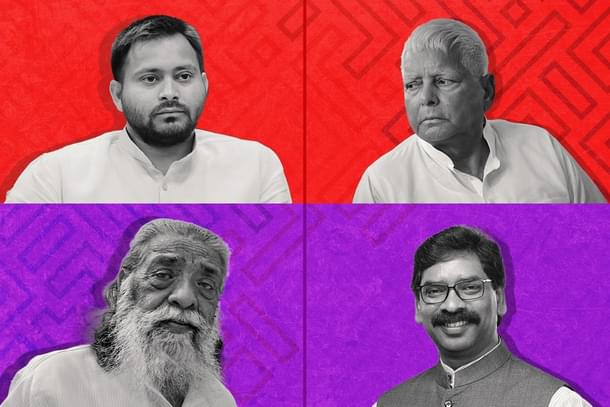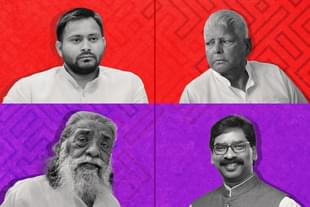Politics
Dynasty Dilemma: Hemant Soren Leans In, Tejashwi Yadav Breaks Away
Abhishek Kumar
Jan 21, 2025, 06:03 PM | Updated Jan 24, 2025, 05:45 PM IST
Save & read from anywhere!
Bookmark stories for easy access on any device or the Swarajya app.


In politics, tapping into one's family legacy is tricky. It can provide a headstart for a budding politician but, make no mistake, can also cause a grave loss.
This contrast is nowhere more intense at present than in Bihar and its younger sibling and neighbour, Jharkhand.
Hemant Soren has tapped into father Shibu Soren’s stature well, while Tejashwi Yadav is struggling to do so in Bihar.
In recent Rashtriya Janata Dal (RJD) posters, Lalu Yadav has been noticeably missing. Put up outside the RJD state office, the posters advertise Tejashwi Yadav as the person of utmost importance for Bihar while noting the promises he is making to the people of the state.
Neither Lalu Yadav nor Rabri Devi, nor any other politician from the family, is represented in these posters. The lantern is depicted, perhaps the only thing symbolising the RJD.
Lalu’s omission hints at Tejashwi's desperation to leave behind the legacy of the RJD’s traditional hold on the Muslim-Yadav (M-Y) vote bank.
Jharkhand is a different story, as evidenced in the 2024 Jharkhand Assembly election.
Hemant Soren’s Jharkhand Mukti Morcha (JMM) banked on its traditional voter base of tribals in the state. And one of the first things Hemant did after re-taking the oath as Chief Minister was to publicly offer respect to his father, Shibu Soren.
Hemant's gesture was crucial because senior Soren is the single most unifying factor in JMM’s functioning throughout its existence. Shibu's name carries the weight of a movement rooted in identity, justice, and the quest for the rights of Jharkhand’s tribals to run their own affairs.
Known as "Guruji" or “Dishom Guru,” Shibu’s role in Jharkhand's statehood movement has immortalised him as a symbol of tribal pride.
Even though he is no longer active in politics, tribal voters — whether new or old — hold a special reverence for him.
Lalu Yadav draws a similar kind of reverence in his state. Most people from the backward communities — both Scheduled Castes (SC) and Other Backward Classes (OBC) — regard Lalu as their great emancipator.
Stories of Lalu visiting people’s homes, holding open-air meetings, keeping a low profile, and remaining relatable to the average population still resonate.
Lalu is often credited with conveying to people that they are not bound by a birth-based caste system and can, therefore, assert their rights. To demonstrate this view, he used to insult bureaucrats, who were mostly from the forward communities, and ensured that the insults appeared in the next day’s newspapers.
People did not care much about Lalu's methods. He ended up being seen as the champion of backwards’ rights in Bihar.
Scholars, especially those who identify as Bahujans or Ambedkarite, also laid the intellectual foundation for Lalu's ways as they argued that his visual politicking helped take the constitutional mandate of a hierarchical casteless society to the hinterland.
But, unlike Shibu, Lalu was neither a mass leader nor did he have short terms as chief minister. Shibu served as Jharkhand’s chief minister for a total of 308 days, spread across three tenures. For Lalu, the corresponding figure is seven years and 130 days. For the rest of the 15 years of infamous RJD rule, Rabri Devi was in charge.
Shibu did not have enough of a bandwidth to wield systematic change as an administrator. Nor did he have close relatives or friends who could exploit the state’s machinery in his name.
Although it is true that Jharkhand has been slow to curb organised crime and Naxalites, Shibu as chief minister cannot solely be blamed for it.
For Lalu, the situation is exactly the opposite. For those willing to write his biography, the challenge is to decouple him from the prevalence of crimes like murders, contract killings, loot, caste wars, the establishment of kidnapping as an industry, and, of course, the fodder scams. The judiciary even used the term ‘jungle raj’ to describe his tenure.
The 'bad name' still hurts the RJD in Bihar, and Tejashwi is the natural sufferer of this reputation by virtue of inheriting Lalu’s throne. Tejashwi has even apologised for the misdeeds of the old days, but, in politics, apologies are often seen as a sign of weakness by average voters.
Lalu’s reign was complicated further by Sadhu Yadav and Subhash Yadav — brothers of Rabri Devi — who ran a parallel administration during those days. Whatever wrong they committed was carried out in the name of the husband-wife duo.
Raju Tiwari, a strongman of the 1990s and currently a Bharatiya Janata Party (BJP) politician, claimed that Lalu had even forbidden Rabri from signing any document provided by her brothers.
The rampant misuse of state machinery became possible because Lalu, who was not a natural contender for the post of chief minister, transformed into a mass leader for social justice.
The perception of Lalu eradicating the stigma around backwardness brought many of Bihar’s SCs, as well as Muslims, on board. During RJD’s rise, Muslims were looking for a new political home in the state after the Bhagalpur riots, and the RJD provided that.
His own caste helped Lalu become the leader of the Yadavs, and the RJD was able to secure 32 per cent of the vote with very little chance of deviation from established voting norms.
In Jharkhand, however, senior Soren, despite being a mass leader, did not command such strength. Tribal voters would stay split between the BJP and the JMM. Both parties even leveraged this political reality by forming coalition governments.
Soren’s short tenures meant that tribals did not taste power enough to feel secure while in the opposition. Conversely, in Bihar, both Muslims and Yadavs enjoyed an extended run in power, and both communities can assert their rights even when they are in opposition. The anxiety around power is not as pronounced in their case.
For the JMM, tribals need to come together, while for the RJD, Muslims and Yadavs can even look elsewhere. A significant chunk of Yadav voters proclaim their support for the BJP, while Muslim voters seem to be tilting towards Prashant Kishor’s Jan Suraaj Party — at least as a symbol of revolt against Tejashwi’s new "MY-BAAP" formula.
The acronym "BAAP" refers to the Bahujan, Agada (forward), Aadhi Aabadi (women), and poor communities. And "MY-BAAP" also reads like the Hindi words mai-baap, which means mother and father.
Tejashwi coined this term and strategy in response to questions over taking Lalu’s legacy forward. However, he is not being allowed by the BJP and its National Democratic Alliance (NDA) partners to break free from the trap of Lalu’s controversial legacy.
Even when Nitish Kumar conducts his yatras, he frequently invokes the 1990s, telling people that it was the NDA rule that set Bihar on the right course after the RJD’s tenure.
Tejashwi has Hemant as an example to look up to within the Indian National Developmental Inclusive (INDI) Alliance. When Hemant was on the verge of being discarded, he sensed key opportunities to establish himself. His populist work during the Covid-19 pandemi was a good beginning.
Later, Hemant got an opportunity to consolidate his position after coming out of jail and framing his arrest as an issue of self-respect for tribals.
Tejashwi’s above-par performance as deputy chief minister gave him some momentum. The recent students’ protest was an excellent opportunity to build upon that momentum, but he is failing to capitalise.
Hemant has solidified himself to such an extent that even if he were to follow Tejashwi’s path and omit Shibu's name from advertisements, voters would not perceive the development as negative. This is not the case with Tejashwi.
Most of the old-school RJD cadres pledge their allegiance to Lalu. Taking him off the promotions comes with the risk of losing longtime voters, as well as failing to gain new voters, since most of the non-MY voter base that Lalu built is no longer with the party.
Abhishek is Staff Writer at Swarajya.





